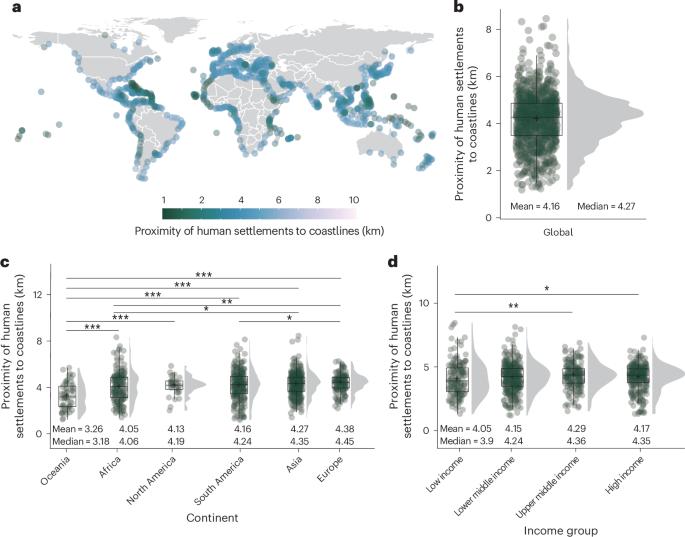易受沿海气候灾害影响的全球沿海人类住区退缩
IF 27.1
1区 地球科学
Q1 ENVIRONMENTAL SCIENCES
引用次数: 0
摘要
从海岸线撤退是人类对沿海气候灾害造成的日益严重的威胁的一种潜在反应。然而,沿海聚落退缩的全球范围、其与当地脆弱性的相关性以及适应差距仍然知之甚少。在这里,我们分析了1992年至2019年的夜间灯光变化,结果表明,56%的沿海次国家地区的定居点从海岸线撤退,28%的地区保持稳定,16%的地区向海岸线靠拢。撤退与沿海气候灾害的历史经验相关性较弱,但在沿海气候灾害易损性较强的地区加速撤退,这表明基础设施保护水平较低,适应能力较差。在46%的低收入地区,特别是非洲和亚洲的低收入地区,定居点要么被迫维持现状,要么被迫向海岸线靠近,这表明在应对未来气候变化风险方面存在巨大的适应差距。沿海聚落退缩反映了人类对沿海气候灾害增加的行为适应。利用1992年至2019年的夜间照明数据,这项研究发现,由于基础设施保护和适应能力不足,全球一半以上的沿海定居点已经撤退。本文章由计算机程序翻译,如有差异,请以英文原文为准。

Global coastal human settlement retreat driven by vulnerability to coastal climate hazards
Retreating from coastlines is one potential human response to the increasing threats posed by coastal climate hazards. However, the global extent of coastal settlement retreat, its correlation with local vulnerabilities, and the adaptation gaps remain less understood. Here we analyse night-time light changes for 1992 to 2019 and show that settlements retreated from coastlines in 56% of coastal subnational regions, remained stable in 28%, and moved closer to coastlines in 16% of these regions. Retreat was weakly associated with historical experiences of coastal climate hazards but accelerated in regions with greater vulnerability to coastal climate hazards—indicated by lower infrastructure protection and less adaptive capacity. In 46% of low-income regions, particularly in Africa and Asia, settlements were forced to either maintain their current status quo or move closer to coastlines, revealing the large adaptation gap in addressing future climate change risks. Coastal settlement retreat reflects human behavioural adaptation to increasing coastal climate hazards. Using night-time light data over 1992–2019, this study finds that over half of global coastal settlements have retreated, driven by insufficient infrastructure protection and adaptive capacity.
求助全文
通过发布文献求助,成功后即可免费获取论文全文。
去求助
来源期刊

Nature Climate Change
ENVIRONMENTAL SCIENCES-METEOROLOGY & ATMOSPHERIC SCIENCES
CiteScore
40.30
自引率
1.60%
发文量
267
审稿时长
4-8 weeks
期刊介绍:
Nature Climate Change is dedicated to addressing the scientific challenge of understanding Earth's changing climate and its societal implications. As a monthly journal, it publishes significant and cutting-edge research on the nature, causes, and impacts of global climate change, as well as its implications for the economy, policy, and the world at large.
The journal publishes original research spanning the natural and social sciences, synthesizing interdisciplinary research to provide a comprehensive understanding of climate change. It upholds the high standards set by all Nature-branded journals, ensuring top-tier original research through a fair and rigorous review process, broad readership access, high standards of copy editing and production, rapid publication, and independence from academic societies and other vested interests.
Nature Climate Change serves as a platform for discussion among experts, publishing opinion, analysis, and review articles. It also features Research Highlights to highlight important developments in the field and original reporting from renowned science journalists in the form of feature articles.
Topics covered in the journal include adaptation, atmospheric science, ecology, economics, energy, impacts and vulnerability, mitigation, oceanography, policy, sociology, and sustainability, among others.
 求助内容:
求助内容: 应助结果提醒方式:
应助结果提醒方式:


